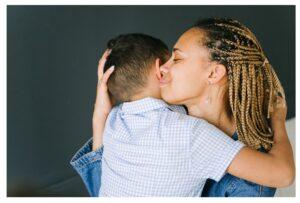Unfortunately, none of us are immune to the heartbreaks of life. Death, dying, grief and loss of all kinds affect us all, including children. Whether it be the loss of a pet, the death of a family member or exposure to other tragedies or hardships in the world, it can be hard to know how to support young children in grief.
Regardless of age, children are sensitive to changes in routine and to changes in the emotions of others – especially increased levels of anxiety, sadness or anger. Children under the age of 3 may not have an intellectual understanding of death, but even infants and babies in utero know when their loved ones are grieving.
Children over the age of 3 may have more of an abstract concept of death. “Forever” is often difficult to understand and a loss may be viewed as temporary or reversible. Children may have “magical thinking” around loss: they might believe their thoughts or behaviors caused things to happen, connecting unrelated events as a way to make sense of a loss. Children often grieve in short doses; they may show little concern at times or may react casually to sad news.
Children are not able to sit down and process their emotions in the same way adults might. Instead, it is common to see grief showing up as anxiety (separation anxiety or new phobias and fears), regressive behaviors (regression in toilet training is a common one), sleep or eating difficulties, hyperactivity or an abundance of energy, or physical symptoms like stomach aches or headaches. All of these things can be a normal part of the grieving process for children and will not last forever. Just like with adults, grieving is not linear. You can expect that children experience strong grief during certain times of year (like anniversary dates, or the holidays) and they may have to reprocess these emotions as they grow and move into different developmental stages.
So how can we support the young children we love during these hard times?
• Provide as much co-regulation and nurturing as possible
• Provide consistency and routine whenever possible
• Help children name and express their emotions
• Reassure children that all emotions are OK
• Reassure children that the death or loss is not their fault
• Give opportunities for children to process grief via play, movement or art
• Be honest, clear and direct when talking to kids about a loss. Try to avoid lies or euphemisms
• Create a safe space for open and honest discussions and questions.
Most of all, families should be gentle with themselves and lean on their support systems as much as needed.
By Bea Burchill, LSCSW, RPT – Mental Health Specialist

